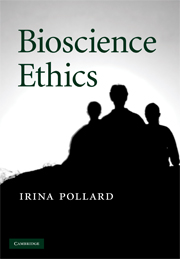Book contents
- Frontmatter
- Contents
- Preface
- Acknowledgements
- 1 Human origins, natural selection and the evolution of ethics
- 2 Sex determination, brain sex and sexual behaviour
- 3 Inappropriate lifestyle and congenital disability in children: basic principles of growth, toxicology, teratogenesis and mutagenesis
- 4 Substance abuse and parenthood: biological mechanisms – bioethical responsibilities
- 5 Fertility awareness: the ovulatory method of birth control, ageing gametes and congenital malformation in children
- 6 Understanding child abuse and its biological consequences
- 7 The state of wellbeing: basic principles, coping strategies and individual mastery
- 8 The state of wellbeing: on the end-of-life care and euthanasia
- 9 Current reproductive technologies: achievements and desired goals
- 10 The recombinant DNA technologies
- 11 Stem cells, nuclear transfer and cloning technology
- 12 Human-dominated ecosystems: re-evaluating environmental priorities
- 13 Human-dominated ecosystems: reclaiming the future for following generations
- 14 Human-dominated ecosystems: warfare = fitness enhancement or losing strategy?
- 15 Human-dominated ecosystems: reworking bioethical frontiers
- Further reading
- Index
13 - Human-dominated ecosystems: reclaiming the future for following generations
Published online by Cambridge University Press: 17 February 2010
- Frontmatter
- Contents
- Preface
- Acknowledgements
- 1 Human origins, natural selection and the evolution of ethics
- 2 Sex determination, brain sex and sexual behaviour
- 3 Inappropriate lifestyle and congenital disability in children: basic principles of growth, toxicology, teratogenesis and mutagenesis
- 4 Substance abuse and parenthood: biological mechanisms – bioethical responsibilities
- 5 Fertility awareness: the ovulatory method of birth control, ageing gametes and congenital malformation in children
- 6 Understanding child abuse and its biological consequences
- 7 The state of wellbeing: basic principles, coping strategies and individual mastery
- 8 The state of wellbeing: on the end-of-life care and euthanasia
- 9 Current reproductive technologies: achievements and desired goals
- 10 The recombinant DNA technologies
- 11 Stem cells, nuclear transfer and cloning technology
- 12 Human-dominated ecosystems: re-evaluating environmental priorities
- 13 Human-dominated ecosystems: reclaiming the future for following generations
- 14 Human-dominated ecosystems: warfare = fitness enhancement or losing strategy?
- 15 Human-dominated ecosystems: reworking bioethical frontiers
- Further reading
- Index
Summary
Only after the last tree has been cut down
Only after the last river has been poisoned
Only after the last fish has been caught
Only then will you find that money cannot be eaten
Cree (Indian prophecy)Self-destructive behaviour and overexploitation of the environment
Our motives for having children are many. They include the evolutionary drive to immortalize our genes, to realize our own procreational potential, to follow the dictates of tradition, or even to exploit them as a source of unpaid labour or security in old age. The previous chapter analysed the positive correlation between fertility, economic activity and environmental deterioration. This chapter develops the theme further, though from different perspectives. In particular, it examines ways that societies lock themselves into a self-sustaining destructive mode of behaviour characterized by high fertility, overexploitation of the local environment and low regard for the rights of future generations.
The tragedy of the commons
Although ‘the tragedy of the commons’ was originally used in a philosophical context, it was eagerly taken up by population ecologists inquiring into the practicalities of ecology, social justice and the natural limits to human reproductive rights. Prominent among those was Garrett Hardin, whose steady contributions since the 1950s were a crucial driving force in the debate's advancement – both from the biological and bioethical points of view. If we are to protect the quality of life of our children, then we must question the corresponding right to breed freely.
- Type
- Chapter
- Information
- Bioscience Ethics , pp. 229 - 242Publisher: Cambridge University PressPrint publication year: 2009



